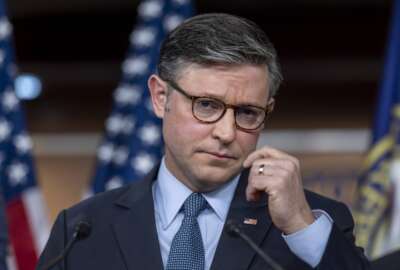Treasury adapts as terrorists change financing tactics
Al-Qaida is struggling to get money, thanks to international efforts to stop terrorism financing, Treasury Secretary Timothy Geithner said at a 9/11 anniversary...
wfedstaff | June 4, 2015 10:53 am
By $30 million before the Sept. 11 terrorist attacks to counting every dollar of its spending a decade later.
After 9/11, the agency established a dedicated office that combines security intelligence with financial controls and international diplomacy. It has worked with financial institutions to recognize and stop suspicious transactions.
“Because of this strategy, donors, financial institutions and facilitators across the world are no longer free to fund and facilitate terrorism with impunity,” Geithner said.
Prior to the attacks, Treasury focused its counterterrorism efforts on combating money laundering, he said.
Al-Qaida spent up to $500,000 to carry out the attacks on the World Trade Center and the Pentagon, according to the 9-11 Commission. Numerous paper trails show that the money was sent, received and spent through ordinary means.
While an attempt at such a large-scale plot with a long money trail would set off alarm bells today, terrorists now are focused on planning simpler attacks.
“The amount of money it costs to fund an attack like that is quite modest,” said National Counterterrorism Center Director Matt Olsen. “We know that al-Qaida in the Arabian Peninsula bragged that a cargo plot on airplanes last fall cost $4,200.”
Looking for such a small sum of money is difficult, he said.
Treasury’s success also has made its job more difficult. Terrorist groups increasingly do not participate in the formal financial sector, which makes it harder for agency officials to detect transactions.
Terrorists no longer depend on money wires, credit cards and commercial bank accounts, for example. Instead, they rely on cash couriers and new technology including stored value cards and transactions by mobile phone, said Treasury undersecretary for terrorism and financial intelligence David Cohen.
“Working with our colleagues in the intelligence community and our partners around the world, we will devise disruption strategies tailored to the ways in which each group raises, stores and moves money,” Cohen said. “As we continue to disrupt specific actors and networks, we will also work to build a more transparent financial system with robust safeguards that are inhospitable to terrorist financing.”
Kuwait and Qatar, both U.S. allies, have become havens for extremist fundraising, he said. Terrorist financing is not a crime in Kuwait. Qatar has been slow to enforce its law against it, he said.
Rather than depend on donations, more terrorist groups are kidnapping people to make money.
Cohen said Treasury was working with international partners to “bolster the no-ransoms approach” to kidnappings. He said the U.S. policy of refusing to pay ransoms had kept Americans out of harm’s way, particularly in North Africa where kidnapping for ransom is a multimillion-dollar industry. He said terrorists preferred to kidnap Europeans, rather than Americans, because they believed European governments were more likely to pay ransoms.
Terrorism also is increasingly homegrown. But Olsen said legal and policy barriers still hamper the government’s intelligence-sharing capabilities.
“That’s a work in progress. There’s more that can be done there to assist us in obtaining the information we need and share it effectively,” at all levels of government, he said. “First responders are so critical, particularly as we confront the threat of homegrown extremists.”
RELATED STORIES:
Turn to kidnapping showed bin Laden’s interest
US accuses Iran of ‘secret deal’ with al-Qaida
(Copyright 2011 by Federal News Radio. All Rights Reserved.)
Copyright © 2025 Federal News Network. All rights reserved. This website is not intended for users located within the European Economic Area.





